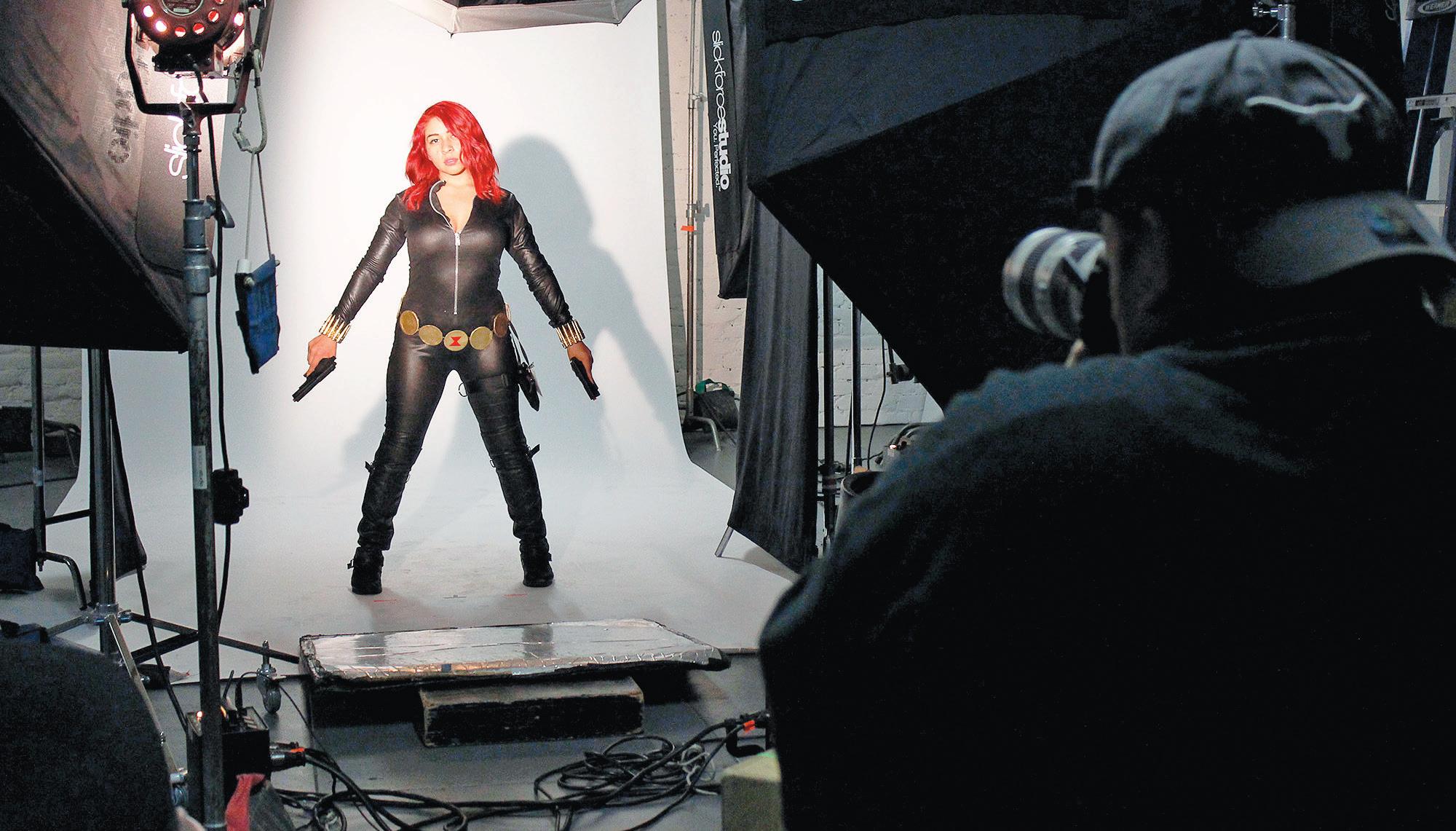
5 minute read
Student hero fights for civil rights
Cosplay enthusiast works to ensure the rights and liberties of the LGBT community
Kitty Rodriguez Roundup Reporter
Advertisement
For many college students, being a full time student and working a part time job is enough to overwhelm them, but this is just the beginning of a busy schedule for one 19-year-old student.
Karina Perez is a political science major, and has been president of the Gay Straight Alliance on campus and involved as a member since 2012.
She is one of a number of students on campus who work toward bringing awareness among the lesbian, gay, bisexual, transgender (LGBT) community as a full-time student at Pierce College. She also cosplays with other comic book fans, dressing up as superheroes. Starting her sophomore year at her high school, Perez felt a need to support the LGBT community and co-found their current program at her school, the Gay Straight Alliance (GSA).
Union, whose mission is to defend and preserve the individual rights of citizens granted by the constitution.
After her sophomore year in high school with GSA, she continued lobbying. She even went to Sacramento to train with service providers that have degrees in conserving the rights and liberties of the community.
“She was just naive and innocent, but she can kill anyone she wants,” Perez said, noting that she took gymnastics after seeing how flexible and acrobatic Harley Quinn was. “I think she is so hyper and bubbly.” online on Facebook.”
Ryan Collins, a former Pierce student, talked about how he met Perez about a year ago during Club Rush. They came across each other at the Robotics Club booth.
“There are so many things wrong with the society and it seemed like there wasn’t anything to do about it,” Perez said. “I decided to stand up and do something about it.”

Perez took initiative in educating others about the LGBT community, and the American Civil Liberties
“There was a need. A lot of people were being bullied and that’s why I founded the GSA network,” Perez said. “I applied for their activist camp and went through rigorous training where they scouted me and told me I would teach others.”
Perez said she was a preppy girl on campus, but always loved Harley Quinn from Batman.
Perez found an interest in cosplay after a friend invited her to the Las Vegas Comic Exposition. She wore a Harley Quinn costume that ended up winning her first prize -- a signed comic book.
Facebook has been a great way for Perez to reach fans, letting her gain a large audience within the first few hours of opening the page.
“First two hours I received over 250 likes,” Perez said. “With 600 likes now and over 1000 friends
“My biggest impression of her was that she seemed accomplished far beyond her years,” Collins said.


Collins was taken aback by Perez when he found out she was much younger than what he thought, but was impressed by her involvement in the LGBT community.
Edward Murillo met Perez through GSA about a year and a half ago, and has seen her grow to become their vice president.
“She’s a very dependable person,” Murillo said. “When she says she’s going to do something, she’s going to do it. Her current goal is to finish her general education and transfer to University of California, Los Angeles, or to University of California, San Diego within the next few years.


In her spare time, Perez enjoys dancing jazz and ballroom. Although it has only been six months since she started to cosplay, she has enjoyed the opportunities that she has had to collect memorabilia along her journey. “Comic books, CDs, and recently a signed shield from the cast from ‘Captain America: The Winter Soldier’ at their world premiere,” Perez said.
Throwing ideas back and forth, researching their interests, and finding understanding in stories of injustice, oppression and inequality, the Feminism Club works to bring information and events to students.
Members can be found every Tuesday afternoon, meeting in the ASO office beneath the Library and Learning Crossroads to quietly discuss historical and contemporary issues in the feminist movement.
This isn’t the only place they can be found. With three years of experience under their belts, the club members are frequently setting up panels to bring their discussions to students as well as doing fundraisers and working alongside other clubs in campus events.
“The panels are for the students and we had a student who actually was on the panel last time and a student moderating the panel, too,” said Denise Robb, professor of political science and club adviser.



“They participate in a lot of different activities. It’s all student run.”
This semester, the members have already held one panel on the history of feminism and are gearing up for another.
“We discussed the issues that went on at that time that made them the waves that they are,” Club President Michelle Allen said.
Michelle Borsco, one of the founding members of the club, said that the attendance was good, with more than thirty guests, but next time they expect a bigger turnout.
“Our next panel will probably have more because it’s about sex positivity,” Borsco said.
Bernard Hanamichi, who has been a club member since its formation three years ago, said they try to appeal to the interests of the students with the topics they present and they tend to draw bigger crowds if the students can relate.
“We just call it the ‘sex positive panel’ so that will probably catch people’s eye and have more of a turnout,” Allen said.
Also on their agenda is the upcoming Day of Politics event, which they are co-sponsoring with other campus organizations.
Events like the Day of Politics are one of the biggest ways for the club to promote its ideas, but they also use classroom announcements, Facebook posts, emails and posters around campus to get the word out. The club also had an all-day fundraiser with Pizza Rev on Thursday, April 24.
Changing restrictions on campus groups





New rules cause di culties for student organizations
College District (LACCD) and the administration of Pierce sets the rules and regulations for the student government and clubs, according to Curtis Smith, adviser for the ASO.
Clubs can add culture to campus life. They can be a way for students to connect with others outside the class, uniting them in a variety of ways from hobbies, to religion, sexuality and more.
Pierce College has nearly 50 clubs on campus, which are listed on the website for the Associated Student Organization (ASO).
But some club officials believe that acquiring money to keep their clubs running is more difficult than it needs to be.
“It certainly is a problem. The school does nothing for us. They need to keep us appraised of how much we have,” said Noble Eisenlauer, adviser for the Anthropology Club. The Los Angeles Community
“It’s a lot of paperwork and a lot of money. It’s discouraging but I guess it’s necessary,” said Catherine Vileisis, co-president of the Psychology Club.
Every time a club wants money from the ASO, they have to fill out various forms. This can be a difficult task for students. They have to collect signatures and submit the forms to the ASO Office.
“It’s not very student friendly. It’s almost as if they were employees of the college,” said Gus Sandoval, president of the ASO.

The money clubs make from fundraising goes into accounts that were created for them by the business office at Pierce.
If a club wants to use its money, it must submit a request to the ASO. Wait times for a request to be approved can take up to seven days.
“It bothers me that we don’t have easy access to our own funds,” said Jacob Billings, president of the French Club.
Even though the money is tracked by the ASO and the LACCD, the clubs still have the ability to choose what they with the money. Some clubs do fundraising, other clubs have different events, and some even offer scholarships.

“I believe that students can do more to be involved with fundraising and events,” said Lisa Martinez, a public policy major and co-president of the Sociology Club.
There is no word on whether or not Pierce administration and the LACCD will change this process.
“I think the district can do more to lighten up on the students,” Eisenlauer said.










